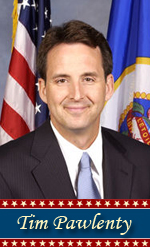
Born: November 27, 1960 in Saint Paul, Minnesota, USA
Early years, education, and early career. Pawlenty is of Polish and German ancestry. He is one of five children of Eugene and Virginia (Oldenburg) Pawlenty. His father drove a milk truck. His mother died of cancer when he was 15. In 1983, he received a B.A. degree in Political Science at the University of Minnesota's College of Liberal Arts. In 1986, he graduated with a law degree from the University of Minnesota Law School. In law school, he met his future wife, Mary Anderson. After their marriage, they settled in Eagan, Minnesota. They have two children: Anna and Mara. Pawlenty first worked as a labor law attorney. Later, he became Vice President for a software-as-a-service company.
Political career In 1989, he was elected to the Eagan’s City Council and in 1992 to the Minnesota House of Representatives. He was re-elected five times and was chosen House Majority Leader when the Republicans became the majority party in the State Legislature in 1998. In the 2002 gubernatorial election Pawlenty campaigned on a pledge not to raise taxes to balance the state's budget deficit, requiring visa expiration dates on driver's licenses, a 24-hour waiting period on abortions, implementing a conceal-carry gun law, and changing the state's education requirements. He won the gubernatorial race, defeating DFL’s Hatch by a margin of <1%. During his first year as governor, Pawlenty balanced a deficit of $4.3 billion primarily by reducing the rate of funding increases for state services, including funding for transportation, social services, and welfare. In 2004, Attorney General Mike Hatch voiced dissent over the cuts and suggested that sex offenders found in some Minnesota nursing homes were the result of budget cuts to social services programs. Later in his first term, disagreement among parties led to a government shutdown in 2005. Transportation, state parks, and other key infrastructures were threatened with the shutdown, dampening the tourism industry. Though he did not raise taxes he did raise some state fees: students' share of the cost of tuition increased by double-digit percentages in 2003. The reaction of skeptics, including was that Pawlenty had reneged on his campaign promise, arguing that the proposal was simply a tax increase by another name. During Pawlenty's term, urban traffic congestion was a significant concern of voters. He appointed his lieutenant governor, Carol Molnau, as transportation commissioner, for which she was approved by the legislature in May 2004. She has been blamed by some for the I-35W bridge collapse. Legislators criticized Molnau's performance, citing ineffective leadership and management, and removed her from that role in February 2008. Pawlenty used or threatened vetoes in 2005, 2007 and 2008 on legislation funding proposed highway expansion, infrastructure repairs, road maintenance, and mass transit. Pawlenty signed into law in May 2005 a bill that will raise the minimum mandated mixture of gasoline and ethanol to 20%. In 2004, Minnesota's Star Tribune newspaper opined that the credibility of Pawlenty's commissioner of health, Dianne Mandernach, suffered when a website posting by the department suggested that abortion might have a role in breast cancer. She resigned in 2007. In 2005, Pawlenty asked a U.S. Senate subcommittee to allow his MinnesotaCare health plan to expand and continue allowing state residents and employees to import cheaper Canadian prescription drugs. During his second term Pawlenty worked throughout 2006 to fund a Minnesota Twins baseball stadium in Minneapolis. The resulting Minnesota Twins-Hennepin County ballpark bill called for an increased county sales tax which passed the state legislature. In June 2006, Pawlenty signed a $999.9 million public works bill that included funding for additional work on the Northstar Commuter rail line, an expanded Faribault prison, a bioscience building at the University of Minnesota, and science facilities at Minnesota State University in Mankato. The bill also funded a $26 million expansion of the University of Minnesota's Carlson School of Management. After the failure and repeal of the Profiles of Learning Kindergarten through 12th grade graduation requirements in a previous session, Pawlenty sought to reinstate them during his governorship. Renamed the Minnesota Academic Standards, they were guided by Department of Education commissioner Cheri Pierson Yecke. The bill's first draft raised several concerns by the education review boards including the amount of content, age-appropriateness, and a European-centric view of the social sciences portion. He has recently used health care funding cuts as a mechanism to balance the state budget. Pawlenty used a line-item veto to remove $381 million from health and human services funding, which could lead to 35,000 Minnesotans losing their General Assistance Medical Care (GAMC) health insurance in 2011. Hennepin County Medical Center—the largest provider of health care to Minnesota's poor and uninsured—closed two clinics, reduced its staff and reduced access to non-emergency services. In April 2008 Pawlenty used his line-item veto on $70 million pledged toward the building of the Central Corridor light-rail project, intended to connect Minneapolis and Saint Paul. Early in 2006, after issuing a study that estimated the cost of illegal immigration to the state as approximately $188 million, Pawlenty announced a program for changing the way the state dealt with persons who are in the United States illegally. Pawlenty was the chairman of the National Governors Association from 2007 to 2008. Pawlenty has a weekly one-hour radio show on WCCO-AM. In February 2008, columnist Robert Novak wrote that Pawlenty was the most conservative Minnesota governor since Governor Christianson in the 1920s. Among voters in Minnesota in April 2009, 46% approved of Pawlenty, while 40% disapproved. Pawlenty has decided not to seek a third term in 2010. Though he was widely considered to be a leading candidate for the vice-presidential nomination on the Republican ticket with John McCain in the 2008 presidential election, Alaska Governor Sarah Palin secured the position. Pawlenty is considered a potential candidate in the 2012 presidential election.
This article uses, among others, material from the Wikipedia article "Tim Pawlenty" licensed under the GNU Free Documentation License. :
Wikipedia
Return to home page:
Prominent Poles